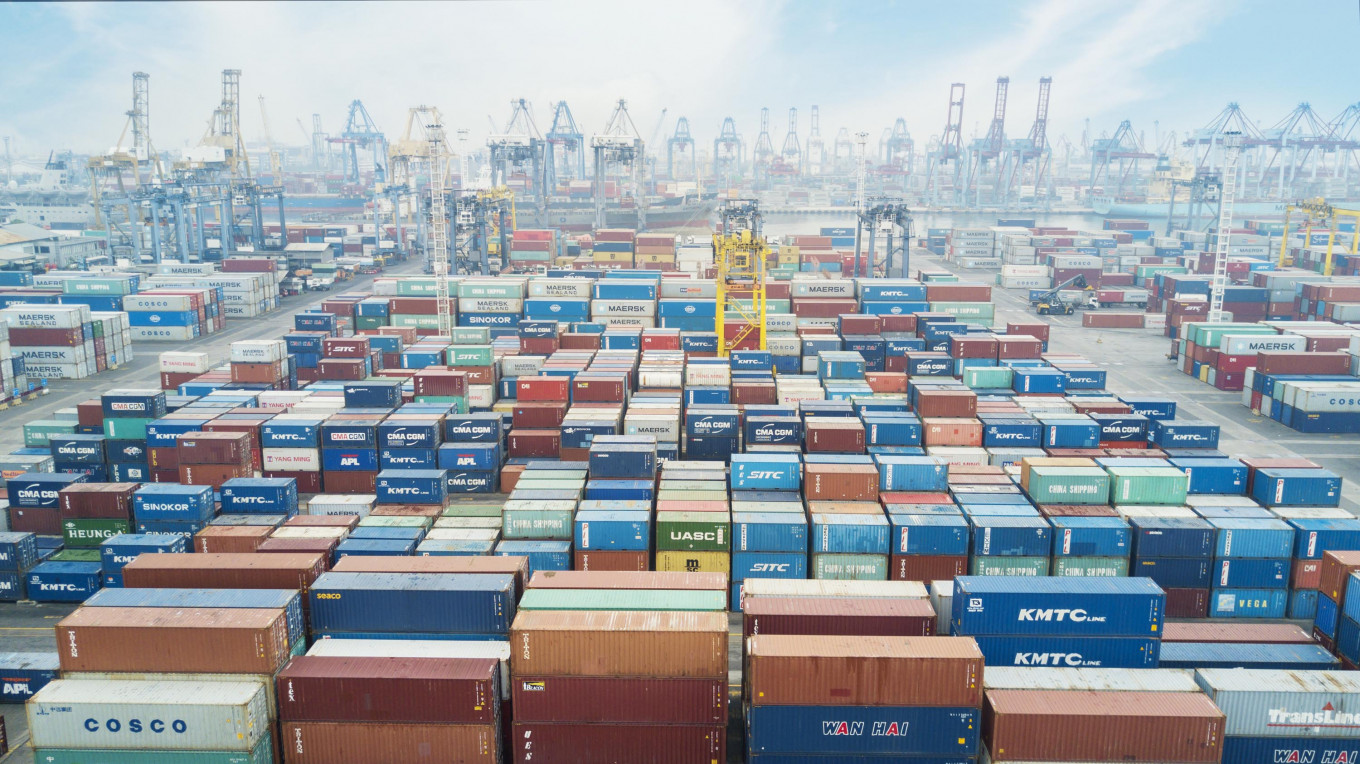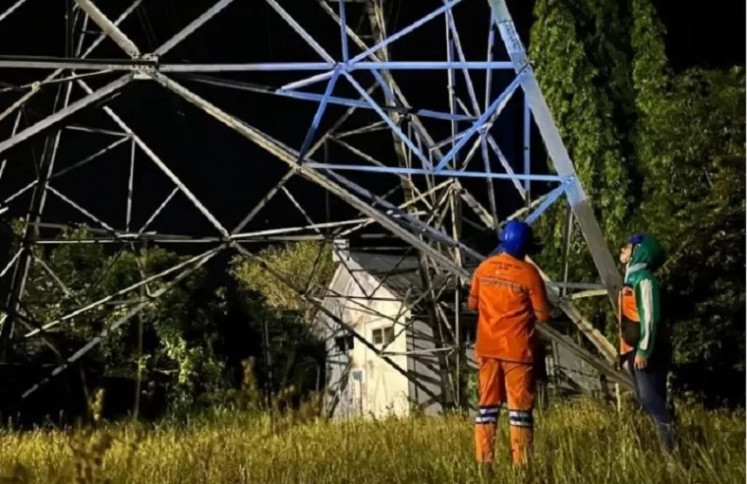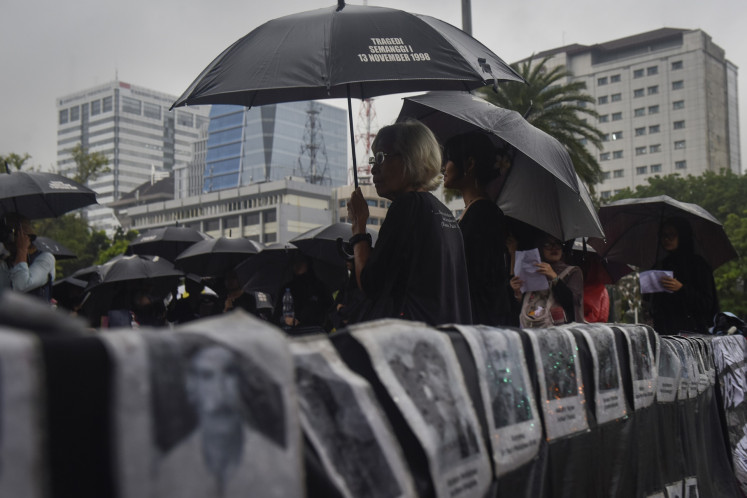Popular Reads
Top Results
Can't find what you're looking for?
View all search resultsPopular Reads
Top Results
Can't find what you're looking for?
View all search resultsCollaboration in logistics’ sector to accelerate faster economic recovery
With ongoing economic challenges impacted by the COVID-19 pandemic, integrating and connecting the logistics system throughout the archipelago of Indonesia have become more important than before.
Change text size
Gift Premium Articles
to Anyone
 Distribution matters: Containers, cranes and container ships are seen at an industrial port of Jakarta. Fulfillment centers established by e-commerce platforms help distribute goods to different areas of Indonesia, hence boosting distribution efficiency. (Shutterstock/Creativa Images).
Usage: 3 (Shutterstock/Creativa Images)
Distribution matters: Containers, cranes and container ships are seen at an industrial port of Jakarta. Fulfillment centers established by e-commerce platforms help distribute goods to different areas of Indonesia, hence boosting distribution efficiency. (Shutterstock/Creativa Images).
Usage: 3 (Shutterstock/Creativa Images)
C
overing more than 17,000 islands within the archipelago, Indonesia’s logistics industry faces many challenges and requires a seamless multimodal transportation system to distribute goods across the nation. In terms of performance, Indonesia has improved its ranking but still lags behind other developing economies in Southeast Asia, securing the 46th position in the latest Logistics Performance Index by the World Bank in 2018, scoring 3.15 out of 5 based on six main indicators.
Aiming to continue to improve the ranking, as well as investment and export activities, the minister of transportation has encouraged collaboration between the government and private players. In Indonesia, the public-private partnerships in the logistics industry have started to gain traction over the past several years alongside the emergence of new technology-based 3PL (third-party logistics) providers, as well as the growing digital transformation adopted by the existing players, creating an opportunity and raising the importance to join forces for all stakeholders in the logistics industry in collectively improving the industry’s development and competitiveness. Ultimately, the improvements in the logistics sector will encourage faster economic recovery in the near future. Here are three areas where I see a particular progress and promise.
The COVID-19 pandemic has struck the country’s economy hard, and the logistics industry is no exception. The Indonesian Logistics Association (ALI) recorded a sharp decline by 50 percent in the overall business performance of logistics players. Despite the spiking growth of B2C (business to consumer) and C2C ( consumer to consumer) delivery services, the sharp drop in B2B (business to business) segment could not be compensated, driven by the plunging logistics volume by 60-70 percent.
In response to the impact of COVID-19 pandemic toward the logistics industry, the implementation of the National Logistics Ecosystem (NLE) was sped up. The National Logistics Ecosystem (NLE) platform, launched to cut red-tape, reduce high logistics costs, and boost competitiveness, enables collaboration between the government and 3PL providers to access and share data and information and allows customers to access transparent pricing and availability of services offered by the logistics players through a single platform. Expected to wrap up in 2024, the NLE platform still has room for improvement and stronger partnerships with players who have competitive advantages.
The logistics industry in Indonesia has experienced a significant growth in specialized shipping, especially in the cold-chain segment. Growing by 4-6 percent annually before the COVID-19 pandemic, the cold-chain logistics was predicted to boost its annual growth to 8-10 percent by 2025 and become the 7th largest cold-chain market globally in 2030, according to the Indonesian Logistics and Forwarders Association. The surging demand of cold-chain shipping is mainly driven by the growing trend of consumers that purchase staple goods through the e-commerce platforms.
Some initiatives in partnering with private logistics players have been announced by several government departments in handling cold-chain logistics. The ministry of maritime affairs and fisheries, for one, announced an initiative to collaborate with private players in the development of logistics infrastructure and transportation for goods requiring cold-chain handling, such as edible fishery products.
Growing involvement in the government’s COVID-19 vaccination program by private cold-chain providers can also be highly anticipated. The minister of health mentioned that a partnership with private cold-chain players was already planned to enhance the cold-chain capacity to accommodate 626 million vaccine doses as the kick-off of COVID-19 vaccination program boosted the demand for cold-chain capacity, in addition to the existing capacity that accommodates the other national vaccination programs, such as for rubella and smallpox.
Aside from the challenging geography of Indonesia, the underdevelopment of infrastructure in the country adds fuel to the challenges faced by the logistics players, leading to the high logistics costs and the lack of industry’s competitiveness. The staggeringly high logistics costs account for 23.5 percent of the country’s GDP, the highest in Asia.
Some private logistics players in Indonesia have tapped into the country’s strategic logistics infrastructure projects through a public-private partnership scheme. For example, seven of the 26 routes in the maritime highway program, an initiative to overcome the infrastructural issues that drive the costly logistics, are operated by private logistics providers. Meanwhile, some private players have also been appointed to operate several logistics ports and airports across the nation as the minister of transportation said the competency of private players would be valuable in improving the performance of the ports. A recent collaboration was also announced between the biggest state-owned port operator Pelindo 1 with PT Transcon Indonesia, a private logistics player, to provide integrated logistics solutions across the ports operated by Pelindo 1.
With ongoing economic challenges impacted by the COVID-19 pandemic, integrating and connecting the logistics system throughout the archipelago of Indonesia have become more important than before. The logistics industry supports all industry sectors, thus it plays a significant role in boosting economic recovery as the improvement of Indonesian logistics system will lower logistics cost and motivate higher purchasing power.
With the growing trend of digital transformation and abundant support from the government, I strongly believe Indonesian logistics industry has a huge potential to overcome the existing challenges and improve local industry’s competitiveness. As the nationwide digital initiative to integrate the logistics sector is already in place, stronger partnerships between logistics players and the government will ensure faster economic recovery.
***
The writer is a cofounder and CEO of Shipper, a logistics start-up.









